Check out some books by your tutor Fiona Veitch Smith … (click on the book covers to find out more)
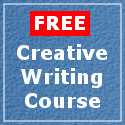 Hello everyone, welcome to the first session of our free online creative writing course. Over the next eight sessions we will be looking at different aspects of creative writing and trying our hand at various forms. I’d strongly encourage you to have a go at the exercises along the way, and please feel free to leave comments or ask questions at the end. If you have arrived on this page without first reading the home page and frequently asked questions page (on tab above) please go back and do so now. If you have read them, enjoy the course!
Hello everyone, welcome to the first session of our free online creative writing course. Over the next eight sessions we will be looking at different aspects of creative writing and trying our hand at various forms. I’d strongly encourage you to have a go at the exercises along the way, and please feel free to leave comments or ask questions at the end. If you have arrived on this page without first reading the home page and frequently asked questions page (on tab above) please go back and do so now. If you have read them, enjoy the course!
Creativity and Art
What is creativity? The Collins dictionary defines it as ‘the ability to cause something to exist’. Without getting into too much of an existential discussion, I would say that with every thought that is expressed, something has been created. It was Descartes who said: ‘I think, therefore I am’; well I would add, ‘I think, therefore I create’ (do you feel a God complex coming on?). But how do we express our thoughts? Sometimes we do it verbally, other times by body language and still again through what is loosely termed ‘art’.
Art takes place when a thought is expressed and fixed in a way that other people may experience it on an aesthetic level – through music, writing, painting, sculpture, choreography and so on. Many artists say that their best work takes place when they ‘by-pass’ the thought and simply express the feeling. This may be true, but for writers, who use a verbal medium, a feeling must first be converted into a thought before it can be put into words. Don’t over analyse the thought before you express it, as this way you can ‘channel’ the purest interpretation of the feeling, but some cognitive process needs to take place. Some writers prefer to mull over a thought and give it form before they put pen to paper – I’m one of them – but it’s good practice to try and switch off the ‘editor’ at least for the first draft. First response trigger exercises are useful in this regard and can release some unexpected words and images.
Exercise 1:
Write down your first response to these words or phrases:
- Blue ball
- And that’s when the sadness came
- Coffee
The first task of a good writer is to convert feelings into thoughts and then into words. This is the raw material that can then be converted into something more permanent. Some writers refuse to toy with their first drafts, believing their creativity will be diluted; I disagree. Allowing your critical mind to improve a piece of writing is where the craftsman meets the artist. Something produced only by the former will lack soul and something by the latter will lack form. Good writing is a combination of art and craft.
For public consumption
Art, of course, is highly subjective and one woman’s masterpiece is another woman’s unmade bed. We all have the ability to create, but whether or not our creation is ‘art’ must be left to the eye or ear of the beholder.
In this session we will look at how you can craft those creative thoughts into creative writing to share with other people. And that’s what sets ‘public’ writing apart from ‘private’ scribblings – there’s a perceived readership in mind. When I ramble on in my journal, I am the only one who will read it (hopefully!) so my only concern is getting my thoughts down on paper. The moment I want someone else to read it I begin to consider ways to improve the presentation and craft it into something more aesthetically pleasing. I consider which words may sound more colourful, whether or not my sentence structure is grammatically correct, whether I’m using evocative imagery, and so on.
Story, feeling or image?
What is it about those creative thoughts that you think might be of interest to other people? Do they speak of an eternal truth or a common experience? Do they make you laugh or cry? Do they suggest a story that will entertain or a poem that captures a moment that must be shared?
Exercise 2: In 50 words or less write down why you want to write then list three creative thoughts that you’ve had lately (each 10 words or less). These may be an image, a musing, a ‘truth’, a story, or so on. If you haven’t had any, take yourself for a walk and look around; what grabs your imagination? Browse through a newspaper or a magazine; do any stories or pictures catch your attention? Think back over your day; did anything funny, charming, shocking or unusual happen to you or someone you know?
Poetry or prose?
Some people are more suited to writing poetry than prose and some people do well at both. Although we won’t be discussing it in this course, other people are more suited to script. I’m one of them. I’ve had relative success as a prose writer and in fact have managed to earn a living from it, but it’s taken years of hard work to get to this point. I recently branched out into scriptwriting and found that I had much more of a natural ability. (If you’re interested in finding out more about scriptwriting, check out getting started in playwrighting). You may find that you’ve been trying to make it as a poet when actually you’re more suited to prose. Now I don’t want to pigeonhole anyone, but ask yourself the following questions:
- Are you more attracted to films than stills?
- Do you enjoy telling people ‘stories’ from your life?
- Do you prefer to read stories or poems?
If yes, to these, then you may be more suited to prose than poetry. If no, then the opposite may be true. If it’s ‘sometimes yes, sometimes no’ then perhaps you are suited to both. We shall be looking at how to write poems in more detail in session 7, but suffice to say, a poem is like a snapshot of a moment. If you can’t rest until you know what happened before and after, then prose may be your genre.
Exercise 3: Take one of the three creative thoughts you wrote down in Exercise 2, then list 20 separate words that communicate or describe that thought. Do not, at this stage, link the words into sentences. Once you have your 20 words use them in a poem of 16 lines or less. Then, take the same 20 words and work them into a short story of under 300 words. Which exercise came more easily? Which form has best communicated your creative thought?
Further Resources:
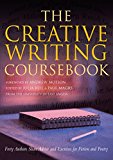
There are some excellent resources out there for creative writers. To get quick ‘starter’ images when your own well is dry I recommend The Writer’s Block by Jason Rekulak. I’m currently working through The Creative Writing Coursebook by Julia Bell and Paul Magrs and finding it very useful.
The next creative writing course session is how to write a short story. But before you move on to that, please feel free to leave a comment or ask a question in the box below.
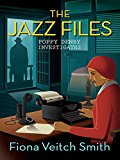
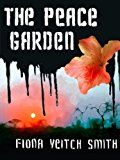
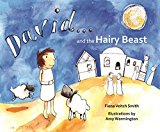
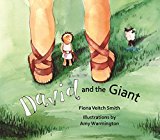
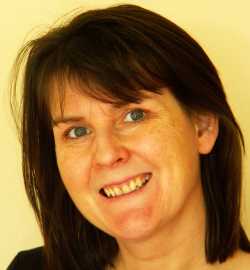 Welcome to The Crafty Writer's free online creative writing course, presented by Fiona Veitch Smith, a freelance journalist, editor, author, playwright, screenwriter and writing teacher. I hope that you'll see a dramatic improvement in the quality of your writing as you work through this course.
Welcome to The Crafty Writer's free online creative writing course, presented by Fiona Veitch Smith, a freelance journalist, editor, author, playwright, screenwriter and writing teacher. I hope that you'll see a dramatic improvement in the quality of your writing as you work through this course.
This is great. Thank you
Hi,
I’ve just started on the course and am finding it very useful. I love writing and have been doing so for a while, yet I’ve never quite thought about why I do it. This exercise helped me to start thinking about why I write and who I write for – critical questions that will no doubt improve my writing. I also enjoyed the exercises and was amazed at how two simple words like “blue ball” could trigger a string of creative thoughts and lead to an interesting story. Thank you for this useful resource and inspiring way of teaching.
You’re welcome, Matilda. Hope you get as much out of the rest of it.
Dear Fiona,
I have always thought that i could write decently well enough but have never tried it out until now. I am hoping that, by the end of this course, i will find out if I am good enough to continue doing so.
Thanks
Binu
Thank you very much for your hard work! I’m so happy to be
taught by a successful writer like you.
I’ve worked in your exercises and I found them pretty helpful.
I like your way of teaching and it made me like I’m actually listening to you.
I will study the rest then I will see how I improved ^_^
Hi, I’ve been writing for many years, love to show my emotion, love and understanding in my poems or writings. I do not however, know the correct ways of putting words together. I love the fact that I have found this site. Thank you.
I pretty quickly, though not fancifully, created a 14 line poem with my twenty words. I made a 358 word short story with about half of the words–my subject was expansive: the life story of my mother. My short story was a snippet from her youth. All-in-all, the prose provided a much deeper well. The poetry does provide a sieve, and I use it sometimes to focus my fiction. Great exercise!
That’s a great way of thinking of the difference between poetry and prose in your writing process.
You might be responsible for me writing a novel. Thank You
Now that’s an accusation I’m willing to accept! I’m busy writing a creative writing course book and in there there will be a number of chapters on how to write a novel. Hopefully out later in the year.
Please explain the structure of your course.
Please read the information on the home page of this website. It will explain everything.
Thanks for that. Good exercise, gave me much needed insight into my writing style. And it was fun!
Fun is always good!
This is extremely helpful
I’m enjoying the course
Thank you Fiona, well presented creative writing course for aspiring beginers. Not overwhelming but thought provoking to focus on; I like your above dictum ‘Good writing is a combination of art and craft.’ I hope to be a Crafty Writer*
Recommended resources are most appropriate.
Glad it’s useful
Well presented; I enjoyed reading ‘Releasing your Creativity’ I like the dictum ‘Good writing is a combination of art and craft’.
Thank you
I write poetry all the time. I tell stories of my life through poetry. I also want to write a book but do not know how to begin. It will be based upon real events and people in my life.
It felt good to be given some direction and then following through. Don’t know if I’ll finish the course but right now I’m having fun. Thanks
A very inspiring lecture. I am encouraged to continue.
Many thanks.
At last a course I can work at at my own pace and understanding, which is available to old age pensioners like myself who cannot afford high costs. I shall recommend to other like minded people.
Thank you.
My 3 creative thoughts are
Sitcom about me and my friends having fun and stuff
Minecrafter who plays on a server and want a revenge
A deaf person who can hear piano sound when sleeping
all of them are ten words but am I doing it right?
anyways, I listed all the 20 words but I listed it based on a story I’m going to create. can I take it as I’m more of a story person and just skip the poem creation? because I’m really blank at starting a poem.
Thanks
The point of this course is to challenge you to release your creativity and move to the next level. If you just want to continue writing what you have always written then perhaps this is not the course for you. Give it a go. Challenge yourself. There is no right and wrong only a reluctance to grow. By the way, I like your piano idea.
Thanks so much for this course. I am a retired teacher who has longed to write for ages. I used to do a lot of writing in my younger years, but got lost in she everyday routine of teaching and family life. I needed something to kick start me again and show me that as long as I still have breath in my body, I can write!
I used to write stories in our local newspaper but I am not even sure now how to get started again. I am interested in short stories.